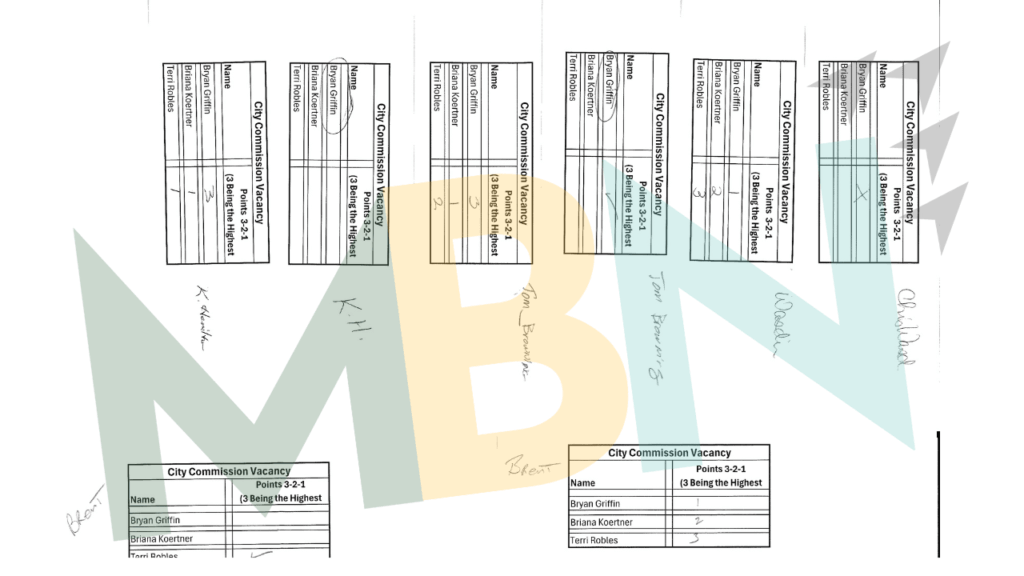
🔍 Bryan Griffin was appointed to the Valparaiso City Commission on June 9, despite ranking second in initial scoring among three candidates.
📄 The final vote was conducted using unsigned ballots, and required a public records request to determine who voted for whom.
⚖️ Legal experts and Attorney General opinions suggest the process may have violated Florida’s Sunshine Law, which mandates open and identifiable voting.
VALPARAISO — Bryan Griffin was appointed to the Valparaiso City Commission on June 9 following the resignation of Commissioner Ed Crosby, who stepped down due to medical reasons announced in April.
But an anonymous ballot marked Griffin’s ascension, which was only revealed after a public records request from Mid Bay News.
We’ve attached it below.

Griffin, a lifelong Valparaiso resident, was one of three applicants for the seat, alongside Terri Robles and Briana Koertner.
The commission initially employed a ranked voting system in which each commissioner assigned one to three points to each candidate. Robles received the highest ranking with 9 points, followed by Griffin with 8 points, and Koertner with 7 points.
Despite Robles’ lead in the initial tally, commissioners then conducted a final vote using signed paper ballots.
Griffin was selected by a 3-1 margin, with Robels receiving the lone vote.
The results of these ballots were read aloud during the meeting, yet the choices of each elected official remained anonymous.
Mid Bay News had to use a public records request to verify the results.
Commissioners Tom Browning, Kay Hamilton and Christine Wasdin voted for Griffin, while Mayor Brent Smith voted for Robels.
That process may violate Florida’s Sunshine Law, which prohibits secret or anonymous votes by public officials and requires that any vote by a board or commission be made openly and in a manner that allows the public to know how each member voted immediately.
According to the law, written ballots can be used in three ways:
The Florida Attorney General’s Office consistently interprets this to mean that voting methods that obscure individual votes, even if the totals are disclosed, violate the Sunshine Law.
In Attorney General Opinion 73-344, the AG warned that delaying or withholding the disclosure of how individual members voted is contrary to the principle of open government.
Additionally, in Opinion 73-264, the AG explicitly stated that “the use of unsigned ballots or methods which do not disclose how each member voted are not permissible under the Sunshine Law.”
Under Florida Statute 286.012, also known as the Sunshine Law, “Each member of a state, county, or municipal board or commission… shall vote on each matter officially considered,” and the vote must be made openly. Failing to do so can result in the action being invalidated or in penalties against the officials involved.
Griffin, who was the only candidate physically present at the June 9 meeting, was sworn in the following afternoon at 3:30 p.m. at City Hall.
In a letter that showed his intent to run for the vacant seat, Griffin emphasized his 41-year history in Valparaiso and his desire to serve.
“I believe that if you want to see change, you have to be that change,” he wrote. A small business owner, Griffin hopes to help the city grow and thrive.
Robles, who ranked highest in the initial scoring, brought more than 30 years of experience in both military and civilian roles. In her application, she cited expertise in aircraft maintenance, program management, and regulatory compliance.
She also pointed to her involvement in the Department of Defense’s Air Installations Compatible Use Zones (AICUZ) program and her interest in land use planning and federal infrastructure grants.
“I can help Valparaiso strike the right balance between military readiness and community development,” Robles wrote.
Koertner, a clinical pharmacist who moved to Valparaiso in 2022, emphasized her long-term commitment to the area.
In her letter, she acknowledged that her background may not seem directly applicable to the role. Still, Koertner believed she possessed the relevant skills in evaluation, attention to detail, and problem-solving.
Despite each candidate’s strengths, Griffin’s physical presence at the meeting swayed the majority of the commission to vote for him.
During deliberations, Commissioner Browning advocated for the new commissioner to be immediately seated to prepare for next month’s budget talks.
Griffin was sworn in the following day and will serve the remainder of Crosby’s term, which ends in 2026.
Register or login with Mid Bay News and never get another pop up on our site!